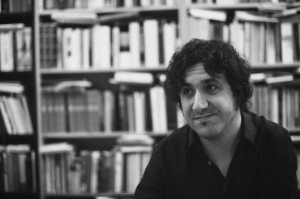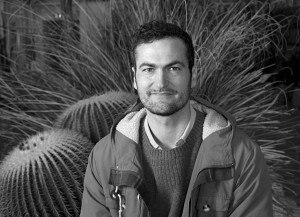(THIS ARTICLE IS MACHINE TRANSLATED by Google from Norwegian)
What does it mean to be Iranian? A Norwegian or a man? And what worldviews have had to give way in order for those who are in power today to have a place? The Norwegian-Iranian author Mazdak Shafieian perceives established definitions as dangerous in relations in society. "As someone who in many ways is between several chairs, I have both as an individual and as a writer experienced the kind of definitions as sad and empty, and also as very dangerous in social relations. We must not forget that we still live in a society where man is not for a single moment detached from defined roles and identifying orders, "Shafieian told Ny Tid. "Where the idea of 'integration' and 'diversity' as a model of society is built by these defined 'units', the essay becomes a form of thinking that barbarically exposes these units to destruction and dissolution," he continues.
He debuted in 2006 with the collection of poems Animal Burial Dark, and even has a family background from Iran. Now he is up to date with the essay collection The ancient material, which deals with authorship from several different language areas.
"Recognizing the past as it is presented to us is the opposite of what the essay as a way of life is."
The author says that as a young boy he already established a close relationship with several of the authors he writes about in the book. “I was actively reading from the age of fourteen, since growing up in a home with many books – my dad literally read even when he was having dinner. The rest of the family were also reading people. Even I had no doubt about what to spend my life on as a teenager, and these writers I have written about have in every way been decisive in how I relate to myself and my surroundings, ”Shafieian says.
Humanistic tradition. I The ancient material The reader is presented for essays on a wide range of authors. Elsa Gress, Svein Jarvoll and Ole Robert Sunde stand side by side with Iranian writers such as Mahmoud Dowlatabadi, Sadegh Hedajat and Ahmad Shamlo. Several of them are the authors and books that Shafieian here introduces to the Norwegian literary public. He himself believes in seeing a close relationship between the authors he writes about in the book. He wants to focus on similarities rather than differences when comparing authors. "The author Mahmoud Dowlatabadi once said: 'We are all children in the same house'. Although the writers I write about are in different language areas, they have a lot in common, especially with regard to their relationship to the past, ”says Shafieian. “I see a lot of similar thinking with Danish Elsa Gress, for example, who is very keen on tracing the hidden and excluded faces in history, and in the writing of Iranian Dowlatabadi. Among other things, he has his own essay on this, where he talks about a cobbler apprentice at Chekhov – a worker who was part of the labor and production conditions, and thus part of the story without having any name or face in the history books. Then Dowlatabadi writes about literature as a place where the oppressed reappears and regains the existence they have been denied, ”he says. "At times, I find the relationship between the authors of the book so close that one would think they knew each other personally and had long conversations together."
He points out that he sees no meaning in categorizing the various authors by which area they belong. “To divide these heads into different categories, just because they come from different countries, I think is sad. They all belong to a humanistic tradition like 'children in the same house'. ”
In the shadow of hegemony. Shafieian seeks to explore our existing worldviews through her authorship. "Recognizing the past as it is presented to us is the opposite of what the essay's way of life is – since it survived in many ways is a series of worldviews that dominate at the expense of 'the oppressed'," he says. is inherited, of course, we must relate to and take seriously, but not recognize in its entirety. I myself am more concerned about what ended up in the shadow and was suppressed for these worldviews to make progress. And with 'the oppressed' I am referring not only to poor and workers who, despite their active participation in the social stream, were excluded from the handover process – but also ideas and tanker goods that were suppressed for a certain ideology to take shape, build up and live on , "Shafieian concludes.
The time of oblivion. Another young, current essayist is short story writer and Vagant writer Sigurd Tenningen, who comes out with the essay collection The triumph of vegetation is total at Gyldendal. The book explores the relationship between art and nature, says the author. “When I write about a novel or a photograph, I want to transfer the speculative moment of the artwork to the essay and develop it further there. The broad culture is obsessed with ranking, naming and categorizing art, but without the ability to rethink its way of thinking, ”says Tenningen. "Here the essay comes as a speculative genre of knowledge," he says.
"The broad culture is obsessed with ranking, naming and categorizing art."
"Obviously, we seem to be living in the age of oblivion, something that Walter Benjamin also lamented 90 years ago. But the oblivion has probably become even more acute with our new media habits, where distraction takes precedence at all times in depth and analysis. The artworks and novels I write about in my book all have in common that they move on a different schedule with a different speed. They think both faster and slower than groundbreaking opinion carriers and commentators, which makes it difficult for them to make an impact, ”says Tenningen.
The starting point for the essays in the book is the phrase "art is the place where man becomes visible as nature". The quote is taken from the controversial, French author Michel Houellebecq, known among other things for the novel The basic ingredients, and according to Tenningen is meant both as a stumbling block and a clue for the essay collection. "I'm not saying that the claim is necessarily correct. It is more of a litmus test for whether the reader is on par with the substance of the book, ”he says. "Houellebecq is obsessed with the idea of the downfall of the West and believes that in today's Europe we are about to slip into a pre-civilization state of nature. With the fetishization of progress, individuality and freedom, modern art and philosophy have paved the way for a mass cynicism unparalleled in history. I do not necessarily agree with Houellebecq, but praise him for developing a consistent cultural criticism in the novel's form. To say that 'art is the place where man becomes visible as nature' can of course be quite plump. I have based the statement to distinguish between those who content themselves with criticizing it with snuff sense, and those who are able to balance speculative statements high above ground level, ”concludes Tenningen.
Mazdak Shafieian (born 1980)

Educated literary scholar at UiB.
Studied at the Academy of Fine Arts in Hordaland.
Debuted with the poem collection Dyregravsmørke in 2006.
Followed up with the poem collection Antwerp in 2011.
Current with the essay collection The ancient material.
Sigurd Tenningen (born 1982)

Author, critic and writer in the journal Vagant.
Has studied literature and language at the universities of Geneva and Bergen, and holds a master's degree in Nordic literature for the University of Agder.
He has previously published the short story collection Gæa (2007) and the chapbook Vevet (2010).
The triumph of vegetation is total is Ignition's first essay collection.

